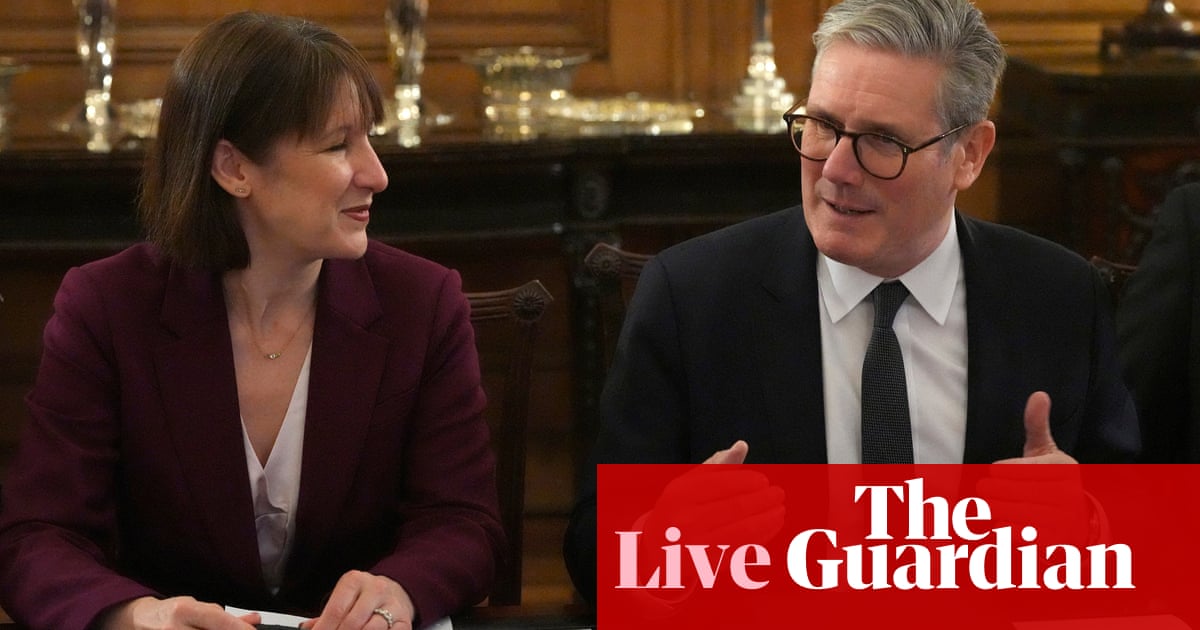No 10 now says Starmer does expect Reeves to stay as chancellor until general election
Downing Street has beefed up its support for Rachel Reeves. The Telegraph was running a headline for much of the afternoon after Keir Starmer’s Q&A saying he refused to promise she would be chancellor by the time of the next election, and other news websites were doing the same. And so at the afternoon lobby briefing the PM’s spokesperson said she was expected to stay in post for the whole of this parliament.
Asked why Starmer was refusing to say Reeves would be in her job for the whole parliament when he had said that about David Lammy (sort of – see 12.26pm), the spokesperson replied:
You heard from the prime minister this morning. He was very explicit. He has full confidence in the chancellor. He’ll be working with her in the role of chancellor for the whole of this parliament to grow the economy and deliver for working people.
The spokesperson was then asked why Starmer did not say that this morning. He did not have an answer, and he just repeated the point about what Starmer said about her this morning.
As night follows day, the spokesperson was then asked if he was able to say that all cabinet ministers would be in post for the whole parliament. The spokesperson would not say that, and instead gave a rather waffly answer about how the PM thought he had appointed the right team when he took office.
A reporter asked, ‘What about Tulip Siddiq?’ Was the PM looking forward to working with her in her current role (a Treasury minister, responsible for dealing with corruption – despite being under investigation for her own links with corruption allegations in Bangladesh) for the whole of this parliament? The spokesperson said that Starmer has said that he has confidence in Siddiq, that she has referred herself to the PM’s adviser on ministers’ interests and that that investigation is ongoing.
Another reporter asked if Yvette Cooper had a five-year job guarantee, like Lammy and Reeves. The spokesperson ducked this question too, saying he was not going to run through all cabinet ministers. All ministers were appointed because they were seen as the best person available, he said.
As a result of all of this, No 10 has knocked down the headlines implying Reeves was on the ropes.
But, in practice, the shift in language does not mean much. In reality there has been little, or no, change to the chances (small, but greater than zero) of Reeves being forced out if the economic crisis gets worse this year. That is because, if a PM decides a minister needs to go, being accused of breaking a promise to keep that person in post is normally the last of their worries. Also, in these circumstances, ministers tend to “resign” anyway, instead of insisting on being sacked.
Key events
-
Early evening summary
-
Sacking Reeves now would be ‘disastrous’ for government, says former Tory chancellor Ken Clarke
-
Energy minister accuses Tories of ‘extremist scaremongering’ over gas supplies
-
Most voters want inquiry into sexual abuse, but 51% think implementing Jay recommendations should come first – poll
-
Which? says government’s plan should do more to protect consumers from risks posed by AI
-
No 10 now says Starmer does expect Reeves to stay as chancellor until general election
-
Water shortage fears as Labour’s first AI growth zone sited next to new reservoir
-
Unite says it has concerns use of AI in workplace could embed discrimination
-
Government’s AI plan does not address its impact on environmental sustainability, Green party says
-
AI must be used ‘to enhance jobs, not cut corners’, says Unison
-
Starmer confirms government will adopt ‘ruthless’ approach to spending review, as he refuses to rule out further cuts
-
Starmer declines to criticise Meta for ditching factcheckers in US
-
Starmer says he is willing to anyone, including Elon Musk, to bring AI to UK
-
Starmer stresses ‘incredible advantage’ of AI when asked about how it might make some jobs redundant
-
Starmer interviewed by Jeremy Vine on Radio 2
-
Starmer says Reeves doing ‘fantastic job’ and has his full confidence
-
Starmer says he is ‘absolutely’ sticking to government’s fiscal rules
-
Starmer sets out how he wants to make UK best place to start and scale up AI businesses
-
Starmer says AI will transform working people’s lives for better
-
Keir Starmer delivers speech on AI
-
Nicola Sturgeon says she and her husband, Peter Murrell, getting divorced
-
Labour’s employment rights bill could led to ‘ugly rush’ of firms firing workers before it becomes law, CBI president claims
-
McFadden rejects suggestions Reeves should be replaced, and says she will still be chancellor in autumn
-
Trying to halt rollout of AI would be like trying to press ‘pause button’ on history, says Pat McFadden
-
Starmer claims AI could led to ‘golden age of public service reform’, even making services ‘feel more human’
Early evening summary
-
Downing Street has said Keir Starmer expects Rachel Reeves to remain as chancellor until the next election. The PM’s spokesperson said this to lobby journalists this afternoon after Starmer refused to say she would definitely stay in post for the whole parliament at a Q&A earlier. It is normal for prime ministers to avoid commitments of this kind, but the Starmer answer led to the Tories claiming that Reeves’ future was at risk. (See 1.11pm.) In truth, although Reeves’ budget is being blamed for helping to suppress growth, there seems to be no immediate likelihood of her being moved – and assurances for the medium or long term are relatively meaningless.
-
Starmer has given a speech stressing what he sees as the enormous potential benefits of artificial intelligence (AI). (See 12.51pm.) He was promoting the government’s AI opportunities action plan published today. Dan Milmo has a summary of its main points.
Unions and the consumer group Which? have said the government should be doing more to address the potential downsides of AI.
Sacking Reeves now would be ‘disastrous’ for government, says former Tory chancellor Ken Clarke
Sacking Rachel Reeves now would be ‘disastrous’ for the government, according to Ken Clarke, the former Tory chancellor.
In an interview with Radio 4’s PM programme, Clarke said that he was disappointed by Reeves’ first budget because she raised taxes so much for business. But he also said being chancellor involved taking unpopular decisions. He told the programme:
Everybody knows what we’re trying to do, which is to make this country an attractive place for business investment again …
I think if Keir Starmer were to sack Rachel Reeves in the present time, it would demonstrate Keir Starmer has even less political nous and skill than I have.
For him to sack his chancellor within six months because she’s actually taken controversial steps with his approval would, I think, be disastrous for the government.
Energy minister accuses Tories of ‘extremist scaremongering’ over gas supplies
An energy minister has accused Tory MPs of “extremist scaremongering” as he denied the UK was close to experiencing blackouts during the cold snap, PA reports. PA says:
Michael Shanks said “at no point” was the prospect of blackouts a concern for the government, despite warnings from energy giant Centrica that UK gas supplies fell to “concerningly low” levels with less than a week’s worth of demand for gas in store.
Shanks also took aim at the Conservative benches after they claimed the UK was “closer than at any point in the last 15 years” to an energy shortage and suggested he should resign if the lights go out.
Gas inventory levels have come under pressure from the cold weather conditions and the end of Russian gas pipeline supplies through Ukraine at the end of last month.
Shanks, responding to an urgent question, told the House of Commons: “Energy security is a key priority for this government, and at no time was there any concern about Britain’s energy system being able to meet demand. Our systems worked entirely as intended.”
He added: “We have sufficient gas supply and electricity capacity to meet demand this winter, due to our diverse and resilient system. While storage is an important flexibility tool in the gas system, our varied sources of gas supply mean the UK is less reliant than some other European countries with more limited supply options.”
Most voters want inquiry into sexual abuse, but 51% think implementing Jay recommendations should come first – poll
Elon Musk has made himself even more unpopular with Britons by attacking Keir Starmer and the government over grooming gangs than he was already, YouGov polling suggests.
As Matthew Smith says in his write-up of the poll, it also shows that three-quarters of people want a national inquiry into sexual abuse by gangs. But more than half of voters think implementing the recommendations of the last inquiry, by Alexis Jay, should come before a new inquiry, the poll says. This Keir Starmer’s position.
Smith says:
A YouGov survey commissioned by the Women’s Policy Centre found that fully 76% of Britons support a national independent inquiry into the sexual abuse and rape of children by grooming gangs.
However, when asked which they think is the bigger priority, half of Britons (51%) say they think implementing the Jay recommendations should be the top focus, compared to 31% who say a new national inquiry is more important. Labour, Conservative and Lib Dem voters say implementing the Jay Review suggestions is the priority, while most Reform UK voters would rather a new inquiry were held.
Which? says government’s plan should do more to protect consumers from risks posed by AI
Which?, the consumer organisation, has said it is concerned that the government’s AI opportunities action plan will not do enough to protect consumers. Rocio Concha, director of policy and advocacy at Which?, said:
Artificial Intelligence (AI) holds immense potential for transforming businesses and benefiting consumers by enhancing their experiences and choices. However, the government’s blueprint does not mention consumers and many remain sceptical about using AI technologies. Which? research has also uncovered examples of AI chatbots putting consumers at risk, for example by recommending unsafe products to shoppers and enabling more sophisticated scams.
The government must put robust regulatory mechanisms in place to monitor, evaluate and control AI systems, alongside best practice guidelines and access to clear and accessible redress schemes, as these will be essential for protecting consumers and empowering them to use these technologies with confidence.
No 10 now says Starmer does expect Reeves to stay as chancellor until general election
Downing Street has beefed up its support for Rachel Reeves. The Telegraph was running a headline for much of the afternoon after Keir Starmer’s Q&A saying he refused to promise she would be chancellor by the time of the next election, and other news websites were doing the same. And so at the afternoon lobby briefing the PM’s spokesperson said she was expected to stay in post for the whole of this parliament.
Asked why Starmer was refusing to say Reeves would be in her job for the whole parliament when he had said that about David Lammy (sort of – see 12.26pm), the spokesperson replied:
You heard from the prime minister this morning. He was very explicit. He has full confidence in the chancellor. He’ll be working with her in the role of chancellor for the whole of this parliament to grow the economy and deliver for working people.
The spokesperson was then asked why Starmer did not say that this morning. He did not have an answer, and he just repeated the point about what Starmer said about her this morning.
As night follows day, the spokesperson was then asked if he was able to say that all cabinet ministers would be in post for the whole parliament. The spokesperson would not say that, and instead gave a rather waffly answer about how the PM thought he had appointed the right team when he took office.
A reporter asked, ‘What about Tulip Siddiq?’ Was the PM looking forward to working with her in her current role (a Treasury minister, responsible for dealing with corruption – despite being under investigation for her own links with corruption allegations in Bangladesh) for the whole of this parliament? The spokesperson said that Starmer has said that he has confidence in Siddiq, that she has referred herself to the PM’s adviser on ministers’ interests and that that investigation is ongoing.
Another reporter asked if Yvette Cooper had a five-year job guarantee, like Lammy and Reeves. The spokesperson ducked this question too, saying he was not going to run through all cabinet ministers. All ministers were appointed because they were seen as the best person available, he said.
As a result of all of this, No 10 has knocked down the headlines implying Reeves was on the ropes.
But, in practice, the shift in language does not mean much. In reality there has been little, or no, change to the chances (small, but greater than zero) of Reeves being forced out if the economic crisis gets worse this year. That is because, if a PM decides a minister needs to go, being accused of breaking a promise to keep that person in post is normally the last of their worries. Also, in these circumstances, ministers tend to “resign” anyway, instead of insisting on being sacked.
Thinktanks have reacted fairly positively to the AI opportunities action plan. The Tony Blair Institute’s response was quoted earlier. (See 10.17am.) Here are three more.
From Carsten Jung, head of AI at IPPR, a leftwing thintank
AI has the power to either disrupt our economy or drive its positive transformation. Our previous research found that AI could either lead to eight million job losses and no GDP gains, or no job losses and GDP gains worth up to £306bn a year. The government has today made it clear that it’s understood this potential and the need to steer AI towards to a positive scenario.
The government has fired the starting gun on giving AI deployment more strategic direction. Next to productivity, AI should also help solve big social challenges such as poor health and the energy transition. Rather than a scattergun approach, AI should be laser-focused on delivering the government’s missions. This will require big changes to the way tech policy is run.
Today’s announcement to invest big in public and private AI infrastructure will be crucial to achieve this. Running public AI on public computers will also be key to ensure citizens’ trust in the technology. Similarly, investing in our regulators so they’re equipped to regulate AI properly will need to go hand in hand with this.
From Alex Krasodomski, director of the digital society programme, at Chatham House, a foreign policy thinktank
Whereas previous administrations focused on the risks of AI, this government is doubling down on its transformational potential for the UK economy. The UK is setting out its stall as it jostles with other countries to be the place for AI investment.
The announcement of increased investment in UK Public AI is particularly significant. While investment by global technology in the UK is an essential driver for growth, ensuring that the public sector is capable of supporting, scrutinising and steering the use of AI in the UK is just as important.
From Pia Hüsch, research fellow in cyber, technology and national security, at RUSI, a defence thinktank
Labour’s AI opportunities action plan has economic growth as the top priority, shifting focus away from the previous government’s priorities around AI safety and regulation. This bold new plan focuses on the creation of jobs and making the UK public service more efficient. In an era of geopolitical competition through technological innovation, Labour’s plan focuses on securing sovereign AI capabilities for the UK’s economic future.
Water shortage fears as Labour’s first AI growth zone sited next to new reservoir
Labour’s first artificial intelligence growth zone will be sited next to the UK’s first new reservoir in 30 years, sparking fears that the AI push will add to the “severe pressure” on water supplies in the area, Helena Horton reports.
Unite says it has concerns use of AI in workplace could embed discrimination
Another big union, Unite, has also called for workers to be fully consulted out the rollout of AI in the workplace. But Unite sounds even more sceptical than Unison (see 3.44pm), saying AI could embed discrimination. In a statement Sharon Graham, the Unite general secretary, said:
The UK needs to embrace new technologies, but we also need proper protections from AI’s pitfalls and workers must have a say in how that happens.
Our members are already reporting major changes to working conditions due to the introduction of AI, which creates new risks and all too often results in workers feeling alienated and demotivated. We also have serious concerns about matters such as AI-powered surveillance and discrimination by algorithm, particularly with ‘high-risk’ decisions like recruitment, performance assessments and discipline.
After years of fighting against discrimination, there is now the genuine threat of it being further embedded through AI, against women, Black and Asian ethnic minority, disabled and LGBTQ+ workers.
Government’s AI plan does not address its impact on environmental sustainability, Green party says
The Green party has also said it is concerned the government’s AI strategy does not make enough allowance for the concerns of members of the public. Adrian Ramsay, the Green co-leader, said:
The potential for AI is huge and Greens welcome the potential it holds, especially in research and innovation.
However, this plan comes almost exclusively from engagement with industry and investors and does not account for the views of the public, or the people working in our public services, about where AI should or should not be used.
If AI is to serve our public services, its uses must instead be driven by the voices of those most affected by this technology development and deployment.
Ramsay also said he was worried about the environmental impact of AI.
One estimate said AI-related infrastructure may soon consume six times more water than Denmark, a country of 6 million people. And a request made through ChatGPT consumes 10 times the electricity of a Google Search.
Yet the action plan does not address these crucial questions of environmental sustainability, let alone the debate about the relative gains from AI versus these obvious harms.
AI must be used ‘to enhance jobs, not cut corners’, says Unison
Unison, the largest union representing public sector workers in the UK, says that if AI is being rolled out for the delivery of public services, staff must be fully consulted. In a comment on the PM’s speech today, Kate Jones, Unison’s policy officer, said:
Artificial intelligence has the power to revolutionise the world of work.
But if AI is to play a positive role in public services, it must be managed carefully and responsibly. That means proper input from workers and all parts of society to ensure it’s not only the voice of big tech being heard.
UK workers have vast expertise and insight that can help shape AI development in ways to benefit everyone. The technology must be used to enhance jobs and services, not cut corners, costs and human input.
History shows that when workers have a real say in how new technologies are developed and used, society is all the better for it.
Sarah Champion, the Labour MP for Rotherham, has called for a national inquiry into grooming gangs. It should be a national inquiry, but locally led, she says.
Child sexual abuse is endemic in the UK and needs to be recognised as a national priority. It is clear that the public distrusts governments and authorities when it comes to preventing and prosecuting child abuse, especially child sexual exploitation. The statistics on these crimes show the scale of the problem; the high level of public concern and mistrust only emphasises why addressing all forms of child abuse must be a government priority.
Having worked widely with victims and survivors, and frontline professionals, I have long believed that we need to fully understand the nature of this crime and the failures in the response of public bodies if we are to truly protect children. It is clear that nothing less than a national inquiry into the failings of those in authority to both prevent, and be accountable for their failings, in relation to grooming gangs will restore the faith in our safeguarding systems.










